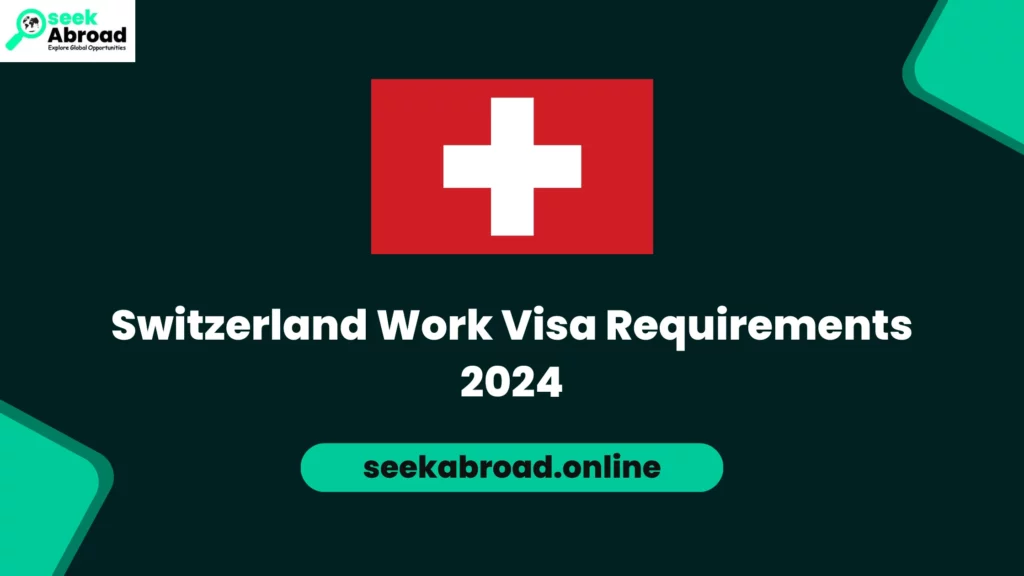Switzerland Work Visa Process 2024
For Switzerland Work Visa Process 2024, you must navigate a complex web of requirements and regulations. In this comprehensive guide, we will walk you through the essential prerequisites and application process to make your dream of working in Switzerland a reality.
Understanding Swiss Work Visas
1. Types of Swiss Work Visas
Switzerland offers several types of work visas, each catering to different categories of foreign workers. Understanding which one suits your situation is crucial. The most common types include:
Short-Term L Permit
This permit is designed for individuals planning to work in Switzerland for a limited period, usually less than a year.
Temporary B Permit
The temporary B permit allows foreign workers to stay in Switzerland for up to five years and is often the choice for contracted employees.
Permanent C Permit
For those seeking long-term residency in Switzerland, the permanent C permit is the ultimate goal. It’s typically granted after several years of temporary residence.
2. Eligibility Criteria
To obtain a Switzerland work visa in 2024, you must meet certain eligibility criteria, which may vary depending on the specific permit type. Generally, you will need:
Educational Qualifications
Most work permits require applicants to have a relevant educational background or professional experience in their field.
Employment Offer
You must secure a job offer from a Swiss employer before applying for a work visa.
Proof of Financial Stability
Demonstrate that you can financially support yourself during your stay in Switzerland.
The Application Process
3. Finding a Job
Job Search
Begin your journey by searching for suitable job openings in Switzerland. Networking and online job portals can be excellent resources.
Employment Offer
Once you receive a job offer, ensure it meets the necessary criteria for a work visa application.
4. Visa Application
Required Documents
Gather the required documents, which typically include your passport, employment contract, and proof of financial means.
Application Submission
Submit your visa application to the Swiss embassy or consulate in your home country.
5. Visa Approval
Waiting Period
The processing time for Swiss work visas varies but usually takes a few months. Be patient during this period.
Visa Issuance
Upon approval, you will receive your work visa, allowing you to enter Switzerland and start your employment.
Life in Switzerland
6. Settling In
Accommodation
Secure accommodation in Switzerland, whether it’s temporary or permanent, to ensure a smooth transition.
Language Skills
Swiss residents typically speak multiple languages, so improving your language skills can greatly enhance your experience.
7. Work and Lifestyle
Work Culture
Familiarize yourself with Swiss work culture, which values punctuality, precision, and efficiency.
Leisure Activities
Explore the vast array of leisure activities Switzerland has to offer, from skiing in the Alps to enjoying the local cuisine.
Conclusion
Obtaining a Switzerland work visa in 2024 is a significant step towards a rewarding professional and personal experience. By understanding the various visa types, eligibility criteria, and the application process, you can embark on this exciting journey with confidence. Switzerland’s stunning landscapes and thriving economy await your arrival.
FAQs
Can I apply for a Swiss work visa without a job offer?
No, a valid job offer from a Swiss employer is a prerequisite for obtaining a Swiss work visa.
What is the processing time for a Swiss work visa?
The processing time can vary, but it usually takes a few months from the date of application submission.
Is it mandatory to speak German to work in Switzerland?
While German is one of the official languages in Switzerland, many Swiss residents speak English, so it may not be mandatory, depending on your job and location.
Can I bring my family with me on a Swiss work visa?
Yes, you can typically bring your immediate family members, such as your spouse and children, with you on a Swiss work visa.
What are the key differences between temporary B permits and permanent C permits?
Temporary B permits have a limited duration (usually up to five years) and are suitable for contracted employees. Permanent C permits, on the other hand, grant long-term residency and are usually obtained after several years of temporary residence.






